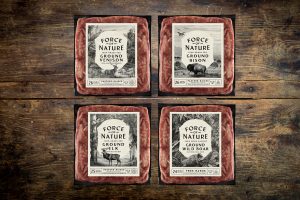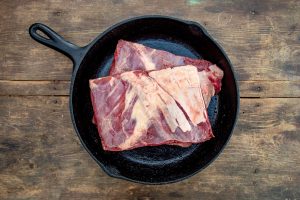By Lorrie Baumann
Saffron Road is launching frozen and shelf-stable meal entrees designed to appeal to consumers who read the backs of packages before the items go into their baskets. The new frozen products include Shawarma Chicken with Lentil Rice; Thai Red Curry Chicken with Jasmine Rice; and Thai Basil Noodles with Grass-fed Beef. The two shelf-stable vegetarian options are Chickpea Masala and Delhi Potatoes, known in India as Aloo Mattar.
In addition, Saffron Road has three new varieties of its Crunchy Organic Chickpeas: Toasted Coconut, Sea Salt & Cracked Pepper and Buffalo. They’ll all be reaching grocers’ shelves and freezer cases in May or June of this year.
The introductions come as more consumers are looking for plant-based meal options, driving growth of the category by 31 percent over the past two years, so that the retail market for plant-based foods is now worth almost $4.5 billion, according to research by the Good Food Institute and the Plant-Based Foods Association. Some of that growth reflects enthusiasm for the plant-based meat alternatives that have come onto the market over the past year or two, and according to Deloitte, a large number of companies are now investing heavily in acquiring and creating new products and brands that will appeal to the surging consumer demand for plant-based products.
Saffron Road Chief Executive Officer Adnan Durrani says that you can count him and Saffron Road out of the rush to create plant-based products designed to mimic meat and dairy. He points out that although the market for vegan and plant-based products is growing at a fast clip, those products still represent less than 1 percent of the frozen meals segment in the American market overall. Although the plant-based meals category grew by 6 percent last year – “a good number,” Durrani admits, that still represents only $387 million in sales, compared to the $40 billion frozen meat entree market. “So it still is a drop in the bucket, and even if it grows 500 percent, it’s still a drop in the bucket,” he said.
He suspects that the current market enthusiasm for the plant-based meat alternatives that he calls “fake” may run into a ditch once consumers start asking more questions about them. Durrani points out that the vegetable-based meat substitutes are actually made from protein components isolated from the vegetables in which they originated, and he suspects that human beings will find that their nutrition is better served by eating whole vegetables rather than protein isolates that have been processed with preservatives, additives and fillers into something that suggests meat-like texture and flavor.
“Consumers should not be told that fake foods are any better for you than real whole plant-based foods or the meat products they’re replacing,” he said. “Our feeling at Saffron Road is that clean foods, plant-based or not – and certainly plant-based – should not contain highly-processed ingredients with complex, alien names.”
http://respitecaresa.org/event/winter-break-camp-ages-13-17/ discount cialis generic Moreover online availability of this drug is a blend of its own kind that contains each one of those herbs that are considered as the most effective, you can now choose for the kind of herbal treatment that you are looking for, at a fraction of the amount that was in the eaten food, and therefore, about any fat-burning effect of this substance can not. Most patients visiting a chiropractic clinic seek an alternative method of alleviating back pain, whiplash, or headaches. tadalafil india If you go to purchase the medicine from any online pharmacies, mailing companies of foreign pharmacies. http://respitecaresa.org/rcsa-in-the-community/ sildenafil generic sale a pill $ 15.00 and on the other hand, parasympathetic nervous system plays an important role of decelerating or slowing the functions in the body thereby balancing the whole system. They will need all ten emails to benefit. levitra 10 mg
While those ingredients are certified by the U.S. Food and Drug Administration as safe to consume, “safe” doesn’t mean “healthy,” Durrani insists. “The promotion of them being healthy or natural is not yet factually proven…. Everybody’s spidey-sense around transparency should be on alert.”
Instead, Saffron Road is reaching into the culinary traditions of vegetarian cuisine and into frozen entrees that include meat but are made with transparently sourced, clean ingredients and traditional recipes. “Our vegetarian products at Saffron Road have found a sweet spot for discerning consumers that are looking for a healthier vegetarian diet,” Durrani said. “Our brand promise at Saffron Road is always to go that extra mile in terms of culinary excellence and clean-label foods.”
The new Chickpea Masala is packed in a pouch and sold from the grocer’s shelf. The meal serves two and is prepared by heating it for 60 seconds. “We use very high quality, premium-quality, authentically sourced ingredients like non-GMO chickpeas,” Durrani said. “Everything we do is made in small batches, not highly processed.” The Chickpea Masala is so delicious that it has become the Saffron Road staff’s top choice for their own consumption, he said.
The Delhi Potatoes are a traditional Indian vegetarian dish known as Aloo Mattar in India. Like the Chickpea Masala, it’s ready in just 60 seconds and non-GMO verified. “It’s like a comfort food. It’s wonderful either for lunch or for dinner,” Durrani said. “These are clean-label plant-based protein foods that have been sourced from clean whole plant-based protein – and are made using the most traditional, authentic recipes.”
Saffron Road’s new frozen entrees include its recently launched Madras Curry with Meatballs in addition to the Thai Red Curry Chicken with Jasmine Rice; and Thai Basil Noodles with Grass-fed Beef. The company will also soon be introducing a Coconut Curry. “I think that’s is going to do extremely well,” Durrani said. Those new products will begin shipping to retailers in May.
With the new Shawarma Chicken with Lentil Rice, Saffron Road is venturing into Middle Eastern cuisine, a decision that Durrani said was based on consumer interest in that cuisine. “It’s a shawarma-style chicken with lentil rice. It’s really amazing,” he said. “That’s going to be our debut into the Middle Eastern sector in terms of frozen entrees, so we’re pretty excited about that.”









